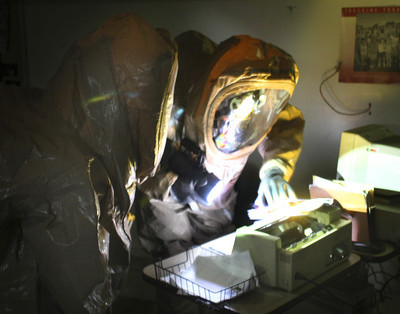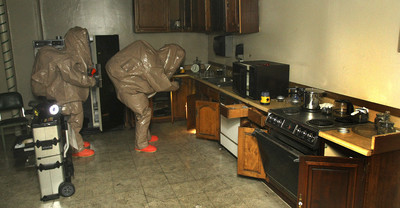Learning Scary Lessons
When multiple vials of ricin were reported at a Las Vegas hotel in late February, the 92nd Civil Support Team went into action.
Dressed in hazardous materials suits that looked like they were made out of camping tarps, the soldiers strapped on heavy, self-contained breathing apparatus and carried detection equipment and communications devices into a hotel suite.
The team of 22 active-duty Nevada National Guard soldiers sent in one group after another, each picking up where the last left off, until they were sure it was safe.
As each of the nine groups left, it went through a 10-minute decontamination process.
They searched for 71/2 hours, most of that time not knowing if any of the deadly substance would be found.
But nerves, anxiety and hearts pounding were not factors for Staff Sgt. Matt Shilk as he suited up and walked into the Extended Stay America at 4270 S. Valley View Boulevard, near Flamingo Road.
"It's our job. It's what we get paid to do," Shilk said Thursday during an exercise in a vacant building at Bonanza Road and Martin Luther King Boulevard.
If the team isn't responding to a hazardous material threat, it's training for one.
Eight people, including three police officers and three employees at the long-term stay hotel, were hospitalized as a precaution after the Feb. 28 incident, but only Roger Von Bergendorff, who had been staying in the room, suffered medical problems, police said.
Bergendorff has recovered.
Shilk said he was confident in his equipment and his team, and was prepared for what they had to deal with, even though it was the first time they had responded to a call that ended up being a serious threat.
"It was easier than what we train for," said Shilk, who has been with the 92nd Civil Support Team for 31/2 years. "We train for the worst-case scenarios."
Training sessions, held about once a month, include everything a real situation would have.
"The more you train, the more proficient you become," said Maj. Ed Locke, commander of the team.
Upon entering the building -- whether for training or for real -- team members don't just get rid of the threat. They also have to gather evidence and information to decide what the danger is and how it should best be handled.
During training sessions, the scenario inside is set up to be as realistic as possible, with unknown substances, stairs to climb, no lights and even simulated "man-down" situations in which someone's suit is ripped.
"It gives the guys an increased level of situational awareness that can't be matched," Locke said.
Unlike other response teams, such as police and fire departments that must deal with lots of different types of calls, the Civil Support Team deals only with chemical, biological, radiological, nuclear and explosives threats.
Its job is to identify chemical agents, assess potential consequences and advise response efforts.
The team finds and contains harmful substances; another agency is hired to destroy them.
If there is a call of a potential threat, team members -- who are always on call -- have one hour to gather at their office at the North Las Vegas Airport. Once there, they leave for the location of the incident within 30 minutes, Locke said.
Approval for their assistance goes through the state's Department of Emergency Management, a part of the Nevada Department of Public Safety.
For the ricin case, that meant three telephone calls lasting a total of eight minutes.
Locke said he has never had a problem obtaining approval.
The team is a state-funded program and does not need the go-ahead from any federal organizations, which helps it to respond more quickly, Locke said.
"It's a great state to work in," he added.
Contact reporter Scott Spjut at sspjut@reviewjournal.com or (702) 383-0279.


















